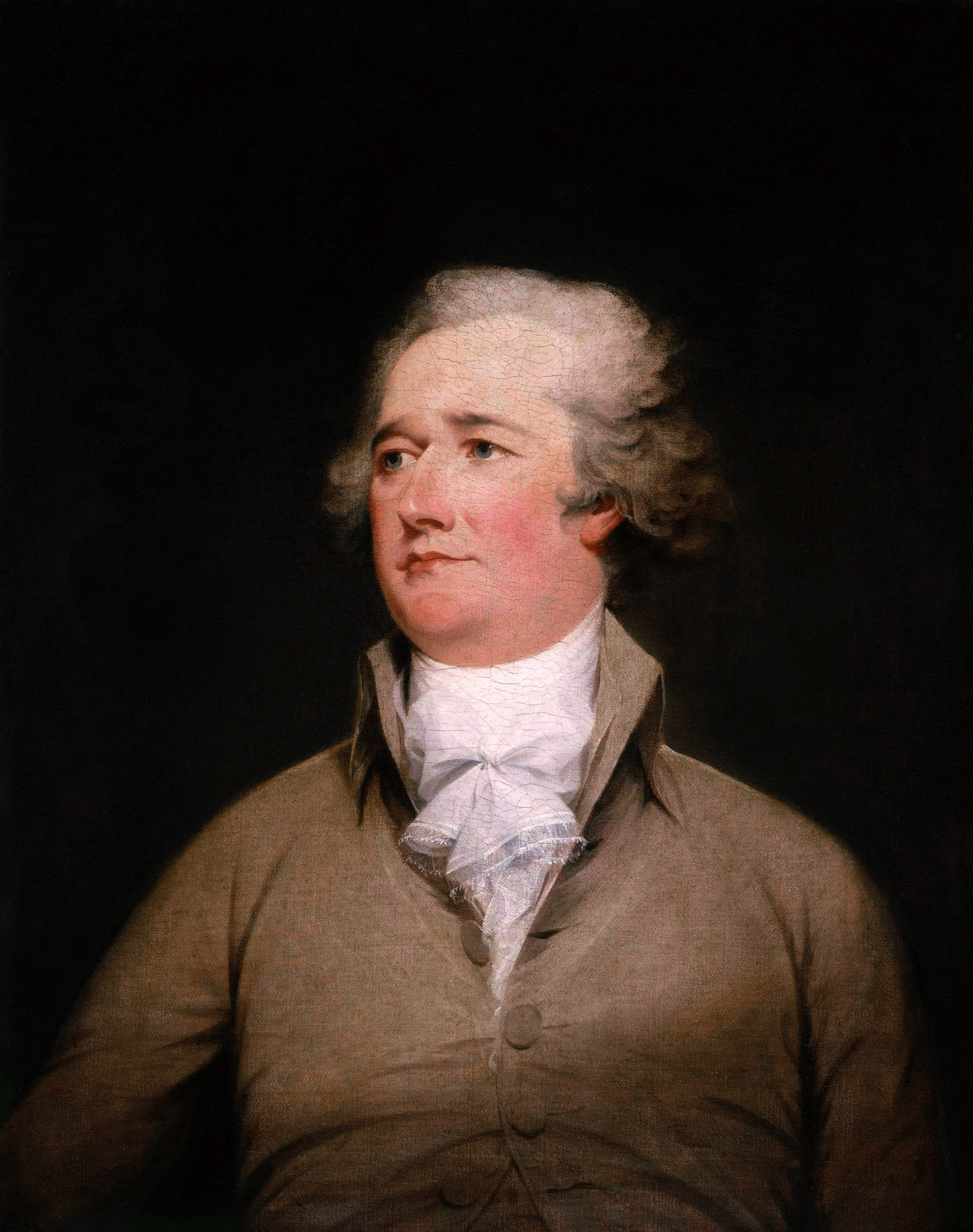Hamilton, Alexander (1755 or 1757-1804), was a noted statesman and political leader during the early years of the United States. He served in President George Washington’s Cabinet as the nation’s first secretary of the treasury. He also was a leader of the Federalist Party, one of the first political parties in the nation.

Hamilton was one of the boldest and most creative thinkers of his time. He supported the establishment of a strong federal government and believed that the U.S. Constitution should be interpreted loosely to give the government greater powers. Hamilton also favored the development of manufacturing to achieve an economic balance between agriculture and industry. He worked to protect the interests of merchants and other business leaders and believed the nation could best be governed by people from these groups.
Many of Hamilton’s policies were strongly opposed by Thomas Jefferson and other political leaders of the time. But today, scholars agree that Hamilton’s ideas have had lasting importance.
Early life.
Hamilton claimed he was born on Jan. 11, 1757. However, his year of birth may have been 1755. A court document gives Hamilton’s age as 13 when his mother died in 1768. Some scholars argue that the document may be inaccurate, pointing out, for example, that it misspells the married name of Hamilton’s mother.
Hamilton was born on the island of Nevis in the West Indies. He was the second child of James Hamilton, a Scottish merchant, and Rachael Lavien, who was separated from her husband. In 1765, James Hamilton left her and their two children.
As a boy, Alexander Hamilton worked for a trading firm on St. Croix, an island in what is now the United States Virgin Islands. His talents so impressed his employers that they helped send him to school in North America in 1772. He attended a school in Elizabethtown (now Elizabeth), New Jersey, and then entered King’s College (now Columbia University).
In 1776, during the Revolutionary War, Hamilton was appointed captain of a New York artillery company. From 1777 to 1781, he served as a colonel on General George Washington’s staff, and as Washington’s secretary and assistant.
In 1780, Hamilton married Elizabeth Schuyler , the daughter of a wealthy New York family. Hamilton and his wife had eight children.
Early political career.
Hamilton was admitted to the bar in New York in 1782 and soon began to practice law there. Also in 1782, he became a delegate from New York to the Congress of the Confederation. The Congress had been established by the Articles of Confederation in 1781, but it had little power (see Articles of Confederation ). In 1786, Hamilton wrote a proposal calling for a convention of the states for the purpose of strengthening the federal government.
The Constitutional Convention met in Philadelphia in 1787. Few of Hamilton’s ideas were included in the U.S. Constitution, but he worked hard for its ratification by the states. Hamilton persuaded two other statesmen, John Jay and James Madison, to join him in writing letters to newspapers urging approval of the Constitution. These essays were later republished in an influential book called The Federalist (see Federalist, The ).
Secretary of the treasury.
Hamilton became secretary of the treasury in 1789. He proposed that Congress establish a national bank to handle the government’s financial operations. This measure was opposed by Secretary of State Thomas Jefferson, who did not believe that Congress had the power to establish such an institution. Hamilton then developed the doctrine of implied powers. This doctrine states that the government has implied powers (those reasonably suggested by the Constitution). The Supreme Court later upheld this doctrine. See Bank of the United States .
Hamilton wanted the government to encourage manufacturing, and he recommended measures for that purpose. Jefferson and Madison opposed such a program because they thought that it would hurt farming interests. Congress did not follow Hamilton’s suggestions until many years later.
In the early 1790’s, the conflicts between Hamilton and a group led by Jefferson and Madison resulted in the development of the nation’s first two political parties. Hamilton led the Federalist Party, which favored a strong federal government. The Democratic-Republican Party, headed by Jefferson and Madison, wanted a weak national government.
Political disputes.
In 1795, Hamilton resigned as treasury secretary because of personal financial problems and increased opposition in Congress. But he remained active in public life and in 1796 helped President Washington write his Farewell Address. See Washington, George (table: Quotations from George Washington) .
John Adams, a Federalist, became president in 1797. Adams and Hamilton had many personal disputes, and they also disagreed about foreign policy and other issues. Shortly before the election of 1800, Hamilton wrote a pamphlet attacking the president. The pamphlet widened a split among the Federalists. As a result, the Democratic-Republican candidates, Thomas Jefferson and Aaron Burr, won the election. Jefferson and Burr received an equal number of electoral votes. Under the voting procedure in use at the time, both men were eligible for the presidency. The House of Representatives had to decide the winner. Hamilton, who distrusted Burr more than he distrusted Jefferson, supported Jefferson for president. Jefferson won, and Burr became vice president. See Jefferson, Thomas (National statesman) .
Burr ran for governor of New York in 1804. Hamilton criticized Burr’s character and worked to defeat him. Burr lost and then challenged Hamilton to a duel with pistols. The two men dueled in Weehawken, New Jersey, on July 11, 1804. Hamilton was shot, and he died the next day.
